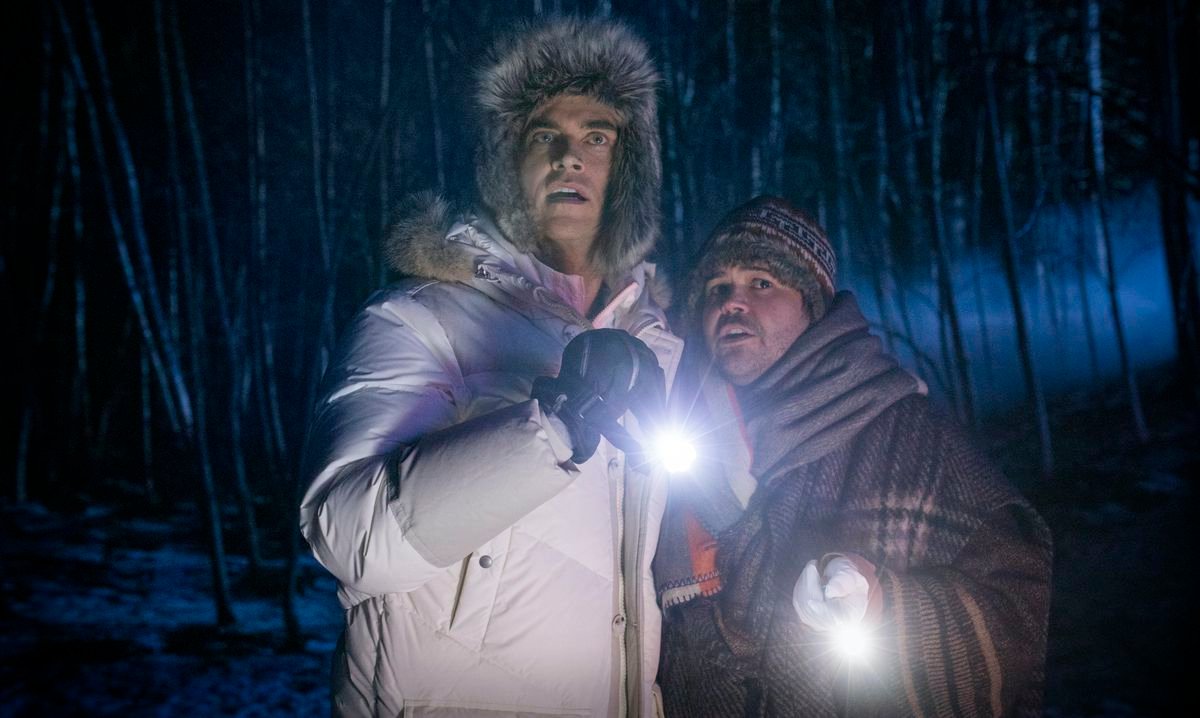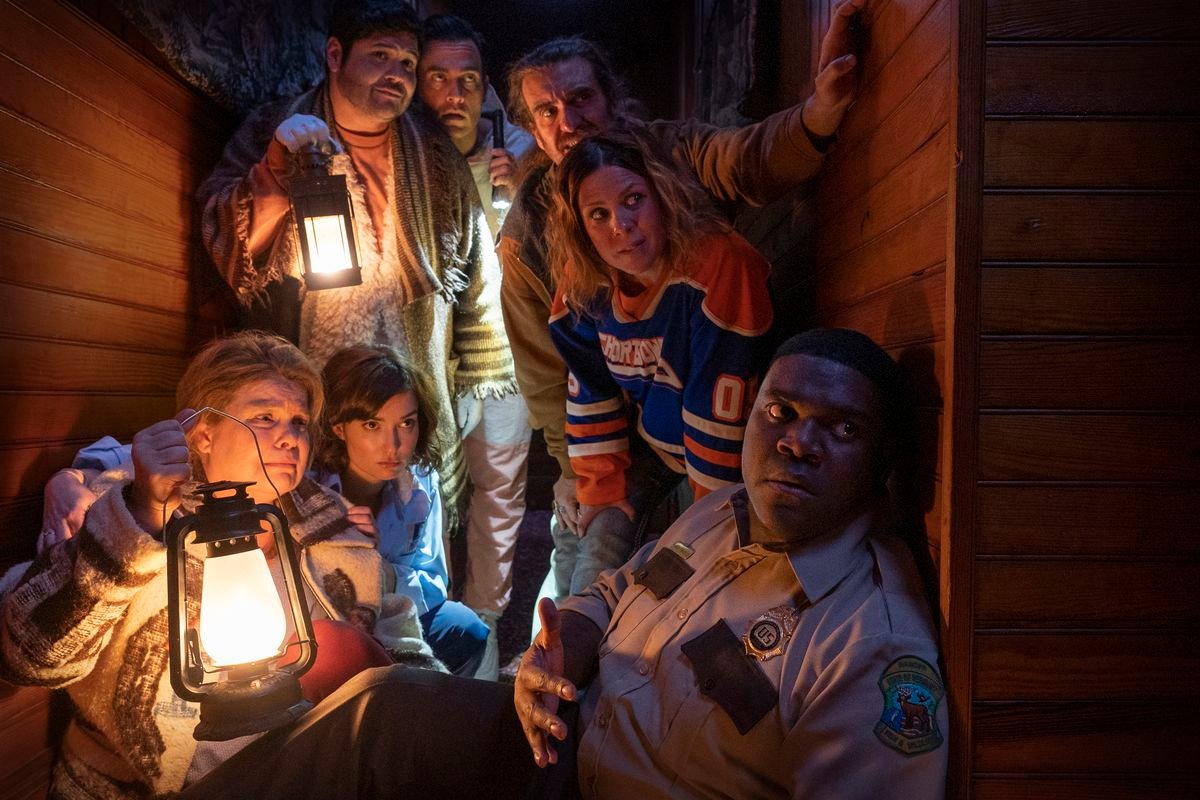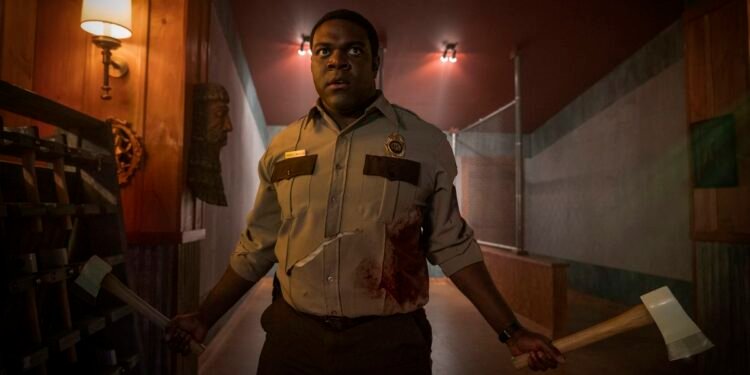Sam Richardson is a delight. He’s engaging as Richard T. Splett on Veep, cheerfully hoping for his father’s death so he can inherit the splett1@splettnet.net email address. He’s hilarious as a player on Tim Robinson’s much-memed sketch-comedy series I Think You Should Leave, yelling at babies and aiding Ebenezer Scrooge in a sci-fi spin on A Christmas Carol. And he’s charming as forest ranger Finn in the consistently funny, unevenly paced horror comedy Werewolves Within, which swaps out the medieval location of its video game origins in favor of a snowy small town (à la the cult classic Phantoms) and Trump-era humor about undesirables and Antifa.
Those latter elements age a film that at its best feels like a cross between the 1987 vampire film The Lost Boys and the 2002 and 2004 live-action Scooby-Doo films, and at its worst stumbles through one predictable character interaction after another. And for best and worst, it also feels like the game that spawned Ubisoft’s video game Werewolves Within: the classic social-deduction party game Werewolf, where a group of hapless villagers try to uncover the monster in their midst as it schemes to kill them off one by one.
Directed by Scare Me’s Josh Ruben, written by debuting screenwriter Mishna Wolff, and produced by Ubisoft Film & Television, Werewolves Within is set in the small mountain town of Beaverfield. It begins with an attack outside of the snow-covered, Overlook Hotel-evoking Beaverfield Inn. A man is knocked off his feet, slashed apart, and dragged into the woods. Nearly a month later, forest ranger Finn (Richardson) drives into town while listening to self-affirmation audiobooks that encourage him to stop “being nice for no reason,” and get more in touch with his masculine side. That’s a difficult ask for Finn, who is polite, accommodating, and mostly nonconfrontational. The only thing that really angers him is when people disrespect nature, so when he meets Midland Gas representative Mr. Parker (Wayne Duvall), he’s immediately distrustful.

Photo: Sabrina Lantos/IFC Films
Parker wants to buy out the entire town for a gas pipeline, and his only holdouts are Beaverfield Inn owner Jeanine (Catherine Curtin), whose husband recently left her, and married couple Devon (Cheyenne Jackson) and Joaquim (Harvey Guillén), whose liberal politics and tech-earned millions make them Parker’s enemies.
Beaverfield is full of eccentrics, and quirky, sarcastic mail carrier Cecily (Milana Vayntrub) — with whom Finn feels an immediate spark — offers to show him around. Each of Finn’s meet-and-greets follows a certain rhythm: The actors’ performances are over the top, whether accented, affected, or both, and Finn stammers and stutters through bemused pleasantries before moving onto the next. On the side of Midland Gas are mechanic Gwen (Sarah Burns), her husband Marcus (George Basil), full-on Karen Trisha Anderson (Michaela Watkins) and her handsy husband Pete (Michael Chernus), who own the town’s maple-syrup farm.
More unclear in terms of their alliances are off-the-grid survivalist Emerson Flint (Glenn Fleshler), who drapes himself in wolf pelts and decorates his home with all kinds of animal skeletons, and environmentalist Dr. Ellis (Rebecca Henderson), who barely leaves the inn room where she’s running an array of science experiments. She keeps unnerving everyone by silently popping up in the middle of other people’s conversations and creeping around corners.
The Beaverfield population is small, but a complicated tangle of grudges and petty grievances ties its inhabitants together. And when they converge on the inn because of a snowstorm that knocks out the town’s power, inexplicable things start to happen. Who, or what, killed and ate Trisha’s dog? Whose body does Finn find under the inn’s porch? What caused the giant gouging slashes in the generators around town? Can Finn “man up” and figure this all out? And did someone really just say the word “werewolf”?
In 2016, Werewolves Within put a networked spin on the familiar party game, just as Among Us did in 2018. Werewolves Within players join VR games, are assigned secret roles like “watcher,” “gossip,” and “deviant,” and have to deduce the identity of the werewolf. Winning in the video game involves either correctly identifying and killing the werewolf, or surviving as the werewolf. But in the movie version of Werewolves Within, the narrative is focused solely on the former option. The pacing is another frustrating difference between the two formats. While the video game is meant to move quickly, cycling through players as they defend themselves or attack others, Werewolves Within spends nearly an hour on all that village setup. That leaves only half an hour or so for the actual whodunnit and werewolf stuff, and in that compressed time frame, the film’s conclusion feels abrupt.
Before then, Werewolves Within relies a fair amount on suggestion and allusion, as well as its characters’ goofy antics and constant bickering. Just as he relied heavily on sound and suggestion in Scare Me, Ruben lets viewers hear echoing growls and heavy footsteps rather than seeing the figure responsible for them. He shows the townspeople’s horrified reactions to the mauled body Finn finds rather than seeing the corpse itself. Those are all routine B-movie elements, but Ruben and Wolff avoiding explicit creature-feature action certainty means the few scary moments successfully land.

Photo: Sabrina Lantos/IFC Films
The dialogue is less effective, though, mainly because Wolff dates it so thoroughly with an array of pop-culture details (Ace of Base, kombucha, Mr. Rogers) and obvious allusions to Trump’s America (“liberal snowflakes,” “lock her up”). Simply repeating references that audiences will recognize is not humor. And certain characters, in particular Dr. Ellis and Parker, are little more than poorly drawn nods to 1980s horror-movie tropes.
Werewolves Within (which would make a solid double-header with the 2019 Irish horror comedy Extra Ordinary) is at its best when it just lets Richardson flicker between the array of guileless reactions that have now become part of his comedic persona: a little naïve, a little befuddled, a little jolly, and finally, a little pissed off. He handles most of the comedic heavy lifting, with squinting disbelief at Trisha’s “Do you celebrate Kwanzaa?” during their first meeting, increasingly unnerved exclamations of “Heavens to Betsy!” as he tracks the werewolf’s path through town, and shock at his own use of the word “fuck.”
And during the film’s final moments, which put a spin on the horror’s final-girl cliches, Richardson’s agreeable acceptance of his own ignorance emphasizes the effectiveness of the film’s central “Who’s the werewolf?” mystery. Richardson’s task is to play off everyone else’s broadness, and his ease in doing so smooths over the rougher patches of Werewolves Within.
Werewolves Within opens in a limited theatrical run on June 25 and is available for digital rental on July 2.
























































